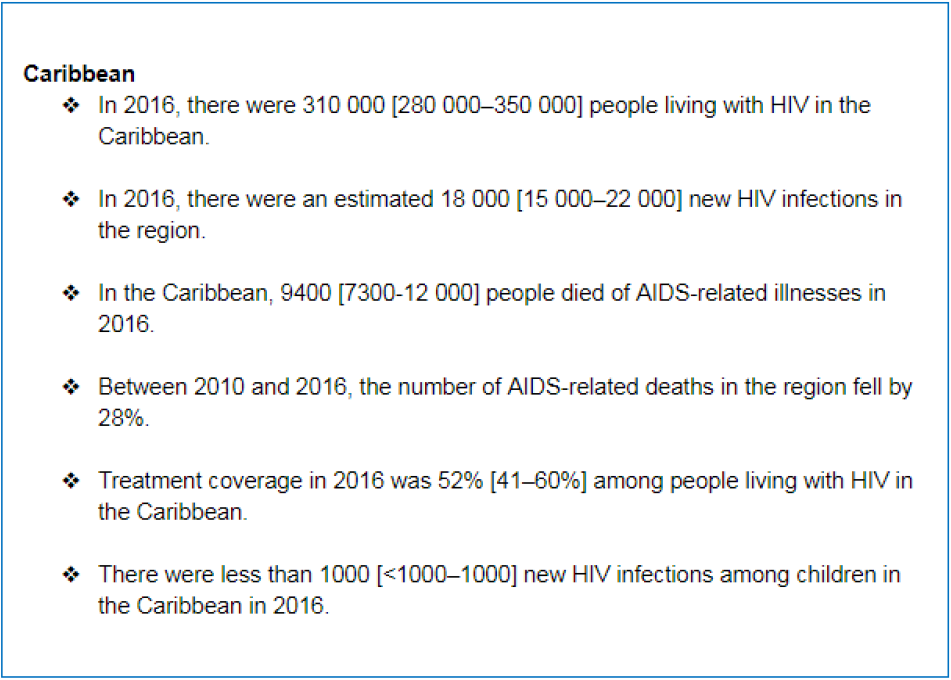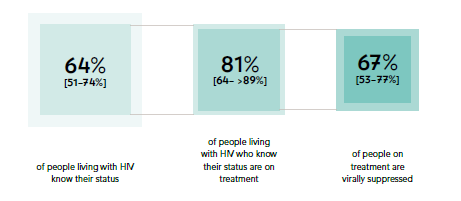Caribbean can reach treatment targets to end AIDS if it accelerates progress Concerted efforts are needed to increase testing and viral suppression


UNAIDS has released its annual flagship report, showing that the Caribbean could reach the testing and treatment targets that will put it on course to end its AIDS epidemic if it accelerates its response. According to Ending AIDS: progress towards the 90-90-90 targets, in order to speed up progress the region must improve strategies to ensure more people living with HIV are diagnosed and that there are higher levels of viral suppression among those on treatment.
“The region has achieved remarkable progress in expanding HIV services,” said UNAIDS Regional Support Team Director for Latin America and the Caribbean, Dr César Núñez. “We need to continue work to ensure that we leave no one behind.”
The report gives a detailed analysis of progress and challenges toward achieving the benchmarks set to help the world achieve the Sustainable Development Goal target of ending the AIDS epidemic by 2030. These targets are for 90% of all people living with HIV to know their status, 90% of diagnosed people to access sustained antiretroviral treatment and 90% of all people accessing treatment to achieve viral suppression by 2020.
Caribbean on track to reach treatment coverage target

The Caribbean has achieved strong progress related to getting people living with HIV on treatment and reducing deaths due to AIDS, but gaps remain. In the region four of five (81%) people living with HIV who know their status are accessing antiretroviral therapy. This means the region as a whole is doing a fairly good job at starting people on treatment following diagnosis. Haiti is the only country in the region to have achieved the second target–at least 90% of diagnosed people on treatment.
HIV treatment coverage has contributed to a 52% decline in AIDS-related deaths in the Caribbean over the last decade. Another positive note is that the scale has tipped and more than half of all people (52%) living with HIV in the region are on antiretroviral therapy. However, there is still a significant proportion of people (48%) not yet accessing treatment.
Region lagging behind on testing and viral suppression
Of concern is the fact that the region is lagging behind on HIV testing and viral suppression. Progress must be accelerated for the Caribbean to achieve the 90-90-90 targets that will set it on course to end the AIDS epidemic by 2030.
One-third of people (36%) living with HIV in the Caribbean are not aware of their HIV status. Community-centred strategies are urgently needed to reach those who have not yet been diagnosed.
The Caribbean must also improve efforts to keep people in care once they’ve started treatment and to ensure that treatment is successful. Only about half of people accessing antiretroviral therapy in the Caribbean had access to routine viral load testing. In 2016 one-third (33%) of those on treatment were not virally suppressed. (“Viral suppression” means that people living with HIV have been treated to lower the level of HIV in their blood to undetectable levels. This protects their health while preventing transmission of the virus). Notably, several countries are getting closer to reaching the target. Three of four people on treatment achieved viral suppression in Barbados, Dominica, Guyana, Suriname and Trinidad and Tobago. Dr Nunez emphasised that “community health workers and civil society are critical to securing early HIV diagnosis and successful treatment”. The report called for greater community involvement in Caribbean health-care provision in order to reach the 90-90-90 targets.
To view the full report clickhere.
Updated data here.
